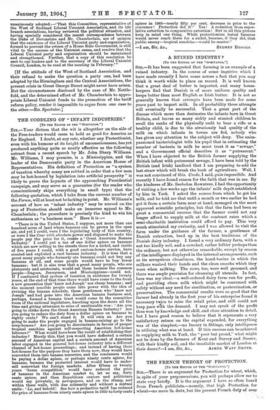(To THE EDITOR OF TIM "SPECTATOR:1
Stn,—It has been suggested that farming is an example of a ruined industry. In the course of some inquiries which I have made recently I have come across a fact that you may think it worth while to place on record. It is well known that a great deal of butter is imported, and many house- keepers find that Danish is of more uniform quality and keeps better than most English or Irish butter. It is not so generally known that attempts have been made for some years past to import milk. In all probability these attempts will eventually be successful. That a great part of the disease which more than decimates the infants born in Great Britain, and leaves so many sickly and stunted children to swell the ranks of the physically unfit to bear a rifle or a healthy child, is due to the atrociously bad quality of the milk on which infants in towns are fed, nobody who has given any attention to the subject will deny. The unim- passioned bacteriologist tells his pupil that in estimating the number of bacteria in milk he must treat it as "sewage," and a Government official describes it as "putrescent." When I have objected to the British farmer supplying the British infant with putrescent sewage, I have been told by the British (and Irish) landlord that I am preparing to add the last straw which will break the back of agriculture. Well, I was not convinced of this. Credo, I said, quia impossibile. And recently I have found reason for the faith that was in me. By the kindness of Mr. Seebohm Rowntree, I had the opportunity of visiting a few weeks ago the infants' milk dep6t established by him in York. I asked the source from which he got his milk, and he told me that until a month or two earlier he had got it from a certain farm near at hand, managed on the most approved scientific principles, but that the farm had been, so great a commercial success that the farmer could not any longer afford to supply milk at the contract rates which a semi-charitable institution could afford to pay. This very much stimulated my curiosity, and I was allowed to visit the farm under the guidance of the farmer, a gentleman of Danish extraction, bred up in the best traditions of the Danish dairy industry. I found a very ordinary farm, with a not too kindly soil, and a cowshed, rather loftier perhaps than the ordinary, but not otherwise remarkable, except by reason of the intelligence displayed in the internal arrangements, such as its scrupulous cleanliness, the hand-basins in which the milkers washed their hands and the clean smocks which they wore when milking. The cows, too, were well groomed, and there was ample provision for cleansing all utensils. In fact, here was my ideal,—a well-ordered dairy farm run for profit, and providing clean milk which might be consumed with safety without any need for sterilisation, or pasteurisation, or preservatives. The commercial results were so good that the farmer had already in the first year of his enterprise found it necessary tVce to raise the retail price, and still could not keep pace with the demand. I may not speak of the profit thus won by knowledge and skill, and close attention to detail, but I have good reason to believe that it represents a very satisfactory return on the capital expended, for everything was of the 'simplest, —no luxury in fittings, only intelligence in utilising what was at hand. If this success can be achieved in supplying milk to York, the "poor but proud," what might not be done by the farmers of Kent and Surrey and Sussex, with their kindly soil, and the insatiable market of London at
their doors P—I am, Sir, &c., .A.IMEE WATT SMYTH.










































 Previous page
Previous page